|
|
|
 |
|
| back |
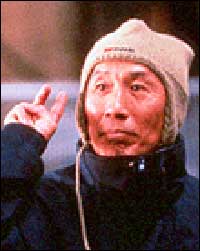 |
Asian Extreme Horror
DVD movie reviews by director Po-Chih Leong
©girlsandcorpsesmagazine
all rights reserved
|
|
|
|
|
You ever watch a horror movie and thirty minutes later you're hungry for another one? Welcome to Asian Extreme Horror.
We gave director Po-Chih Leong five Asian horror movies to review (by Tartan Video) He disappeared -- we thought forever -- and then we received his reviews (below).
Po-Chih Leong is an accomplished filmmaker in his own right, directing over two dozen feature films in China, including: Jumping Ash, Hong Kong 1941, and Shanghai 1920. In the UK. Leong's credits include: Ping Pong, The Wisdom of Crocodiles with Jude Law. and a documentary TV series Riding the Tiger. His films have been shown at film festivals around the world. In the US his credits: Cabin By The Lake, The Darkling, Return to Cabin by The Lake, and the Detonator with Wesley Snipes. Po-Chih Leong lives and works in Hong Kong and America.
--------
The past years have seen an influx of horror movies -- a boon for us horror junkies in the witching hours. Some great (the Descent), some okay, some trashy. My favorite in the past three years is Dawn of the Dead. I identified with the thirty year old with a mid life crisis, trying to get back to his girl friend, and his laid back approach - to Zombies.
The most interesting horror movies are coming out of Asia -- Japan and Korea. Tartan has released most of these on DVD. Each of the following films has an original take on the horror genre.
|
|
|
Marebito (Stranger from afar) is Shimuzu's first feature. He made the Ju-On horror low budget series, each shot in 8 days (if only we had the balls to do that in LA). He's part of the J Horror genre - shot simply, with very basic locations and minimum cast, shot on HD.
Shimuzu's world is wonderfully weird. Marebito starts with a CU of eyes - the eyes of a news cameraman recording a man about to commit suicide. He wants to record the fear that makes the man stab his own eye. Was the man afraid to face fear? Our man goes in search of that fear, a journey that takes him to an underworld of homeless spirits -- he rescues a young woman chained to a wall, takes her back to his home that is crammed with cameras, computers and TV monitors. The young woman begins to dominate his existence. She survives on blood. They fall in love. He cuts his own lip for the girl to feed on, and ends up in the underground with the girl.
We know where this is heading -- pretty weird, huh?
There is a sense of impending doom, an encroaching fear. Shimuzu is not out to make us scream, or provide shocks. He wants us to experience that fear. Few people exist in his world. His hero is lonely, cut off from society. Shimuzu raises questions, leaving us to figure out what the fear is. Not everything is tied up in a neat package.
The cameraman is played by fellow director Tsukamato, who's very natural in the role. In Asian movies it's common for directors to appear in other's movies. I appeared in a role in Tsui Huk's "Dangerous Encounters". We like to help each other out and watch each other work.
One of Simuzu's gimmicks is the use of the TV monitor. Our man records his own home. He discovers there are 12 missing seconds on the tape recording the woman. What happened in the 12 seconds? It's scary. Japanese horror movies create suspense and horror out of the TV monitor -- in the climax of the Ring a woman steps out of a TV. Shimuzu uses a TV to create suspense in " What is so wonderful is there is no rational explanation for such events. American horror films require a logical explanation. Asian horror movies leave such mysteries as part of the genre. Scary.
Shimuzu has made the transition to Hollywood with the Grudge. The world in Grudge is pretty lonely -- people throw themselves off roof tops. Terrifying.
|
|
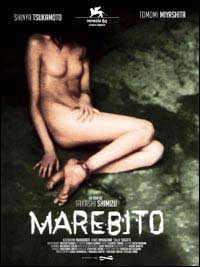
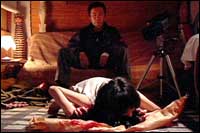
|
|
|
|
|
|
R-Point, Directed by Kong Soo Chang. The Korean film industry is the liveliest, the most inventive in Asia. It has a bunch of gifted film makers.
Few horror films use war as a setting. This is set in the Vietnam War when Korea was part of America's attempt to defeat the Vietcong. (The VC feared the Koreans for their violence). A Korean commander is sent on a mission to find a lost battalion in a Vietcong area -- R-Point. His battalion comes across a warning - Those with blood on their hands will not return. A feeling of doom -- this is a great set up.
His team is ambushed by the VC -- interestingly we never see the VC. Everything is seen from the Korean point of view. The Commander kills, only to discover the enemy is a woman.
We never see the enemy, the Vietcong. The battalion takes refuge in a creepy mansion in the middle of nowhere. An American unit turns up, warns them -- then leaves.
The battalion feels it is being watched. Kong Soo Chang piles on the suspense. The Commander is lost in a fog, and finds himself in a graveyard of French soldiers who died 15 years earlier. Was this another lost battalion? Suddenly we're in the realm of the supernatural, His soldiers find a cassette tape, play back rock music -- suddenly there are screams of the missing platoon he is searching for.
They find the American unit does not exist, they are ghosts that vanish into the jungle. The Koreans start killing each other, leaving the commander on his own. He sees a beautiful woman -- it's the woman he killed in the skirmish. The Koreans send out another search party -- this time for the Commander's unit. The cycle continues...
The movie was shot in Cambodia. There is tremendous potential in the material. It delivers some scary moments, it slowly builds the tension, and all hell is let loose. BUT - It's conventional, and finally a let down. It could have been in the league of Kubrick's "The Shining". The horror does terrify, but does not resonate, it lacks power. You kind of know what's going to happen. The soldiers are war movie clichés -- the fresh-faced naive soldier, a hard nosed sergeant who has seen it all, the commander disillusioned with war. You don't feel for them like the characters in "The Exorcist".
It's enjoyable, creepy. It has a great premise, but fails to live up to its potential.
|
|
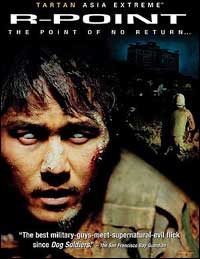
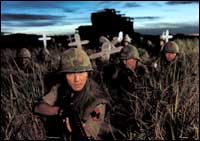
|
|
|
|
|
|
Tale Of Two Sisters is a SCARE treat. Directed by Ji-woon Kim.
Two teenage sisters arrive at country house. Their father has remarried with a young woman after their mother's tragic death. Living under the same roof as step mom is a nightmare for the two sisters. Older sister Su-Mi protects younger sister, the distressed Su-Yeon. Step mom is strict, highly strung, she's determined to rule the roost.
There is a great build of tension with shots of feet and hands. What's going on in the sisters' minds? The horror is gothic, nostalgic, sad. Shot beautifully on one location -- a country house with 19th century European furnishings. The setting and props give a sense of foreboding. The use of space in the house adds to the suspense. The color scheme of reds and blues with the flowery wall paper gives a sense of another dimension.
We're in for a scary ride. Like Roman Polanski's "Rosemary's Baby" and "The Tenant" -- it is a study of women under psychological stress. Many scenes are silent.
The movie works on many levels. Like a Chinese box - open one, you find another, then another. Each with a hidden secret and eye opening twist. Everyone appears normal, a family living under the shadow of the dead mother. It's revealed Older Sister Su-Mi is living a delusion. She imagines she's with her younger sister who is in fact dead. Did she kill her? She's angry with her Dad for marrying again, and summons up young sister Su-Yeon. A further twist - Su-Yeon discovers she in fact is not alive and is a ghost, she can't cope with the truth, goes mad. A final twist -- step mom is not married to their father -- she's a nurse looking after the deluded Su-Mi. The nurse can't handle the situation, ends up driven mad.
The women play multiple personalities. Traditional horror films show multiple personalities through one person -- this has several people play multiple personalities. The point of view constantly changes. The director shows great discipline with simple camera setups -- his timing is unhurried, ominous. The horror resonates. The cast is excellent.
Make up a list of your interpretation of the events in the story - a movie that you want to see again and again. Hollywood has bought the rights for a remake. Scary.
These stories are the most difficult to tell -- they're normally full of holes. Is Su-Mi credible? The DVD has an interview with a psychiatrist who finds her situation and reactions logical and realistic.
|
|
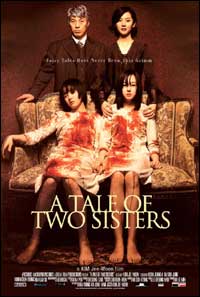
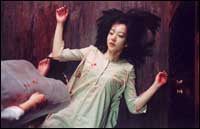
|
|
|
|
|
|
Vengeance Is Mine. Directed by Chan-wook Park, the most promising and talented filmmaker in Asia. He is unusual and witty. He combines violence, horror & humor.
A story of revenge. Ryu, a deaf and dumb factory worker, trying to get money for his sister who needs an organ transplant. He kidnaps his boss's daughter for ransom money. The daughter drowns in an accident. His boss is out for revenge, kills Ryu's girl friend. Ryu and his boss commit desperate acts of violence. The boss kills Ryu and is killed by friends of the girl friend.
There are stunning images -- the factory where Ryu works. Park has a dynamic, visceral style. He combines horror and humor, creating the most difficult of genres -- the absurd. It's unsettling. Do we laugh or cry? He raises conflicting emotions -- Ryu takes the daughter to a river bank where he buries his sister. The deaf Ryu buries his sister in the foreground -- it's tragic, while behind him the daughter flails in the water -- it's funny & shocking. In another scene four young men masturbate while listening to Ryu's girl friend having an orgasm next door. The camera tracks to reveal the girl in fact is having a panic attack while Ryu reads a comic book.
The bosss revenge is shocking. He tortures Ryu's girl friend, applying electric wires to her ears. A memorable scene captured in long shot, with the camera static. Chan uses close-ups with wide shots, which forces the audience to take an active part in the experience. Watching the film is an experience. He starts with a close-up and Ryu but half his face is hidden. You want to see what he's thinking.
His style is like jazz - free wheeling, he's having fun. The 1st half is about Ryu, the 2nd centers on the boss when the guilt ridden boss finds salvation. There is sympathy for both characters.
He shows details other directors wouldn't show. He doesn't show what they would show -- we don't see the daughter's kidnap.
The story is generic -- one of revenge. His film making overcomes this limitation. You get the feeling the movie is a rehearsal of greater things to come. Here's a talented director in search of a great story.
|
|
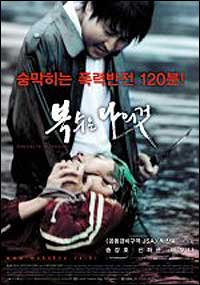
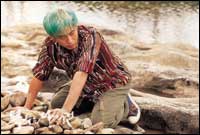
|
|
|
|
|
|
He found it in Old Boy. The best film to come out of Asian cinema in the last three years. Chan-wook Park has honed his talents to a great story.
The film starts off with the everyman, loud mouth Dae Su, raving drunk in a police station. He leaves, wakes up locked up in a room -- he doesn't know where or why. He only sees the feet of a guard. He is imprisoned for 15 years, he loses part of his memory, his only vision of the outside world is the TV -- he sees the Twin Towers bombed, Hong Kong reverting back to China. There is news of his wife's murder and he is the main suspect.
After 15 years he finds himself free on a roof. He encounters a would be suicide victim about to throw himself off the roof. The world has changed. Dae Se finds a girl friend.
He seeks vengeance - who locked him up and why? He returns to his jail -- exacts revenge - in one long fight he fight off the guards.
He finds out a company boss responsible -- they went to the same school. As a young boy the boss had incest with his own sister -- the young talkative Dae revealed it. The sister committed suicide. The grown up boy seeks revenge. In a violent confrontation the boss reveals a terrible truth to Dae Su (which I won't reveal). Dae Su cuts off his own tongue, kills the boss. He finds salvation.
There is a touch Kafka about this story -- the absurd, at times violent, witty, tragic. It is not plot driven film. Dae's journey is painful, emotional and shocking. He perseveres, finally finds salvation. He is child like and profound in his search for a place in the world. Chan-wook Park leaves no easy answers. The audience must figure that out.
He rises to the challenge -- like in rodeo, he rides the wild bull with supreme confidence. We gets inside Dae's head hearing his running monologue.
It's absurd, in your face visceral, violent, witty, leaving us physically exhausted. The violence is visually stunning. It differs from the Hollywood horror movies -- there is no gratuitous gore. Its strength is that it is unpredictable; you never know what's going to happen next. It's fun. Chan-wook Park is giving away no freebies, you have to experience it, work at it
The film making is rigorous in its discipline. There is a fight scene, shot in one take when Dae fights a gang of thugs. Chan-wook Park reveals Dae's relentless determination in a single shot. Shades of John Woo's Hard Boiled. Hollywood would have shot this with swift, jerky camera movements, frenetic cutting, CGs (as in Mission Impossible 3). Meticulously crafted, he makes use of the high angle shot -- when he looks down on a scene, commenting on the action. Korean filmmakers are in the forefront in the use of the high angle.
Korean men are macho, mean, tough bastards. Chan-wook Park's hero is equivalent to a Sam Peckinpah hero, out of place, out of time with their society.
Old Boy has everything. A film that deserves repeated viewing.
|
|
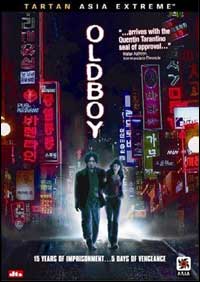
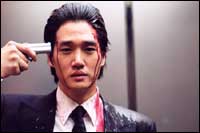
|
|
|
|
|
|
I've had blast seeing all these movies. They can be seen on TARTAN video. Tartan have done a great job in providing the little Extras on the DVDs -- interviews with directors; the director of Two Sisters interviews his cast and asks them what they think of his directing. The director of Marebito compares his work to Hollywood horror movies. Chan-wook Park has fun in his Q&A session with a Korean audience.
Order these and other movies on DVD from Tartan Video at: www.tartanvideousa.com
About Tartan:
U.K.-based Tartan Films, formed in 1982 by Hamish McAlpine, is one of Britain's most respected distributors of films, both to the theatrical market and on home video. The company has released more than 300 films in that country, including such acclaimed titles as The Cooler, Super Size Me, Capturing the Friedmans, Secretary and The Triplets of Belleville.
The U.S. arm of Tartan, headquartered in Los Angeles, Calif., was launched in July 2004 with an eclectic slate of films from established auteurs and up-and-coming filmmakers. The company has both theatrical and home video divisions with plans to release 10 theatrical films in 2005 and over 30 titles on DVD.
Look for a cutting-edge slate of innovative, acclaimed and award-winning feature films to be released theatrically by Tartan U.S.A. and to the home entertainment market by Tartan Video. From American independents' fare to major film festival winners to the best of international cinema, they are films from around the world that entertain, provoke and inspire...and are sometimes controversial.
|
|
|
|
|
|
|
|
|
|
|
|